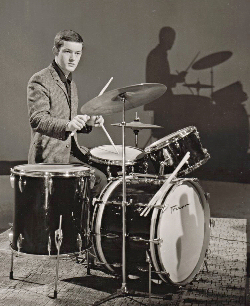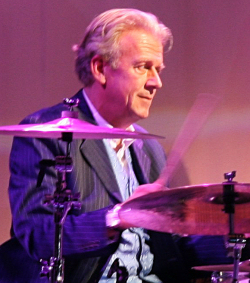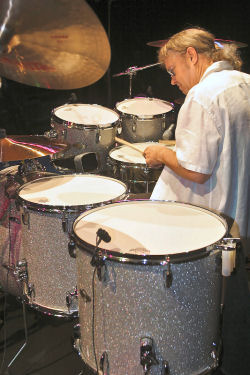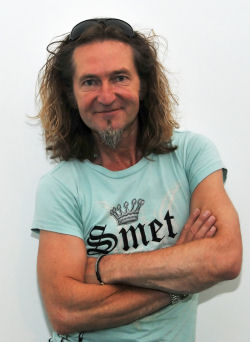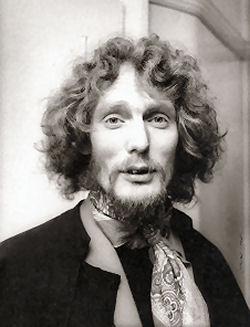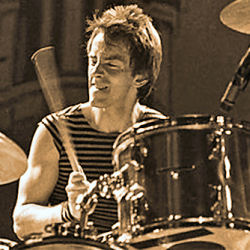 Topper Headon, legendary drummer with the enormously influential and most iconic punk rock band of all time The Clash, bounded up to me looking slim, fit, tanned, healthy and happy. Topper’s battles with drink and hard drugs have been well documented and when Orion publish his autobiography in a few years time I’m sure he’ll set the record straight. His story is a rollercoaster ride of epic proportions but my aim was to get to what really makes the man tick; the thing that made him ‘Topper’ in the first place – his dazzling, natural drumming skills. We talked drums for hours and I was struck by his passion and energy. He played tracks and raved over this drummer and that beat with all the enthusiasm of a teenager, he was gracious, generous and disarmingly honest. I liked him a lot and after spending all day in his company I felt like I’d made a new friend.
Topper Headon, legendary drummer with the enormously influential and most iconic punk rock band of all time The Clash, bounded up to me looking slim, fit, tanned, healthy and happy. Topper’s battles with drink and hard drugs have been well documented and when Orion publish his autobiography in a few years time I’m sure he’ll set the record straight. His story is a rollercoaster ride of epic proportions but my aim was to get to what really makes the man tick; the thing that made him ‘Topper’ in the first place – his dazzling, natural drumming skills. We talked drums for hours and I was struck by his passion and energy. He played tracks and raved over this drummer and that beat with all the enthusiasm of a teenager, he was gracious, generous and disarmingly honest. I liked him a lot and after spending all day in his company I felt like I’d made a new friend.
What first attracted you to the drums?
It was seeing Keith Moon play – I was watching The Who on Top Of The Pops, it was My Generation they were doing and I just thought . . . I want to be Keith Moon. I loved the way he was the focal point of the band. He looked completely nuts, good looking – just everything I wanted to be! That’s when I realised I liked the drums.
So how old were you when you got your first drum kit?
I was 13 and I’d broken my leg. They had set it wrong and I was in plaster for nearly six months. I used to play a lot of football and I was getting bored so the doctor suggested I find something else to occupy my time so I got a snare drum and that was it.
What about your first kit?
It was an Ajax kit, which had single headed toms with a black mother of pearl finish – it was a funny little kit. I didn’t get on with the bass drum pedal so I went out and bought a Premier pedal – the 250S, metallic blue metal pedal with a rubber footpad and it was just beautiful. I used those pedals all the way through The Clash – forever! Eight pounds it cost me, I got it in Dover! I ALWAYS used those pedals and made sure I had stocks and stocks of them just in case they stopped making them. If I could get hold of them now I’d still use them, I think they’re brilliant pedals!
Did you have drum lessons?
I never had a lesson, I was never taught anything! When I started playing the drums, I could drum! It was just one of those things I could do, I loved doing and I wanted to do more.
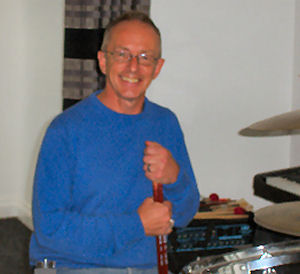
Topper today
Did you ever have another drummer casually show you how to do things, like how to hold the sticks or what a paradiddle was?
No! No one ever taught me how to hold the sticks. I bought a book; I got the one by the guy from The Shadows, Brian Bennett. I learned about the orthodox grip from that, and I watched other drummers. If you watch other drummers you can learn – when you watch other drummers you can see how they play. When I started to play Trad Jazz, all the drummers used orthodox grip.
So you were learning from the guys playing in the trad band.
Yeah, and Top Of The Pops. I saw The Groundhogs play, they were one of my favourite groups with Ken Pustelnik on the drums, he used matched grip and I just watched. The trad jazz guys at the pub were teaching me about feel. All of my contemporaries, the boys I was still at school with who formed rock bands, they didn’t know about feel and holding it down. To them, playing behind the beat or on the beat or in front of the beat was gobbledegook! (laughs)
So, you started off with traditional grip? When did you change to matched grip and why?
I just noticed that a lot of rock drummers played with matched grip. I mean I used to switch. Obviously playing jazz I’d use traditional grip, that’s what I’d seen the other trad drummers doing. With the matched grip I found I got so much more power – that’s what it was about really, power! The only drummer I know who really got a lot of power out of his orthodox grip is Stewart Copeland; I don’t know how he does it!
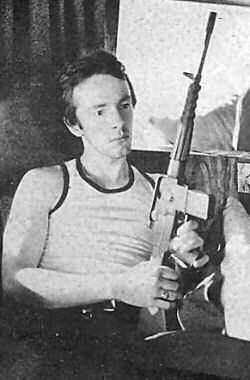
Topper Headon
What jazz players were you influenced by in the very early days?
Well, as I said, my first influences were the guys in the pub playing trad jazz. I’d go down the pub on a Sunday and play with them, simple Jazz beats – easy to play but you had to have good tempo. Then one night, I’m in the Louie Armstrong pub and the landlord said he had a problem. The Marines band he played in Force Nine had a gig but their drummer was ill so he asked me if I’d sit in with them, so I said “Yeah”. My father drove the drums down to this gig in Deal – bless him – and they said “Do you read music?” and I said “Yeah” . . . and I couldn’t read a single note! But I’d heard them play before and they did Blood Sweat And Tears songs and stuff by Chicago, stuff that I knew, all twelve bar. So, I’m all set up in the corner of this pub and I turned to the bass player about ten minutes before we’re due to start and I said, “Excuse me – I can’t read!” He was horrified. I asked him to give me cues and stop and start points, which he did and I got through the gig. At the end of it they said would I do a gig next week with them. On the way to the gig the following Saturday I said “Listen, I can’t read” and they said “What!?” I said “Sorry but I can’t read!” They all went “That’s alright mate” and from then on I started playing with them, I was doing a good job and holding it all down. I was bluffing it but it worked. Just by being musical, if you’re musical, I’ve found you can play anything – just feel it.
Which famous Jazz players did you admire?
I used to love Gene Krupa, all that Drum Boogie – and Drumming Man, which I did as a single myself later on. He was a showman drummer and when I decided to be a drummer I didn’t want to be what the drummer should be. I didn’t just want to hold down the beat! I wanted to be like Gene Krupa or Keith Moon – lets face it they were virtuoso instrumentalist’s, they certainly weren’t at the back holding down the back beat. But, by the time I’d got into drumming, I realised that’s what a drummer had to do. Listening to Terry Williams from Man showed me how a drummer could hold the band together and power the band. Buddy Rich influenced me, Harvey Mason then Billy Cobham came out – I loved Billy and the Spectrum album. Steve Gadd too, I love his playing on Steely Dan’s Aja album. Keef Hartley inspired me, he was with John Mayal and the Bluesbreakers, he released some great solo albums, one of my particular favourites is Half Breed, you should check it out!
How did you develop your rock steady time feel?
It was just something I could do. To me, to be a good drummer you’ve got to have perfect tempo, so if you don’t have perfect tempo, then you can’t be a good drummer! I learnt that from all the jazz musicians and I learned that I had a good tempo! I realised how important that was – it was all soaking in. I thought, right, OK I see, that’s important is it? I must really watch that, I must watch that I don’t speed up or slow down. I could play in front of the beat, behind the beat and on the beat but never speed up or slow down! I had all these guys in their thirties and forties, seasoned trad jazz musicians and I got the music marines, all guys in their twenties at the time who could sight read dots – I was holding both those gigs down – and they were all teaching me stuff.
Is it true that you had to re assess your playing when early on a few people said that you didn’t hit hard enough? How did you combat this problem?
Well . . . I just decided to hit them harder. You see when I moved up from Dover to London I’d been playing mostly trad jazz – I didn’t realise volume and power were really important. In London I got a gig with a guy called Pat Travers and I was sacked from him for not playing the drums hard enough. I then started playing with a couple of his friends and I got the sack from them for the same thing. When Mick (Mick Jones, guitar player and singer with The Clash) invited me down to audition for The Clash I thought well, I’ve been bitten twice for not hitting hard enough so I went down to the audition and just bashed shit out of the drums. When I joined The Clash I just relearned my whole style – I reassessed everything and made a conscious decision to HIT HARDER.
You see before I joined The Clash I was a good drummer, just average to good but once I’d joined the band and re-learnt my whole style – that’s what – if I may say, made me into a great drummer. I had all the jazz and funk styles – the soul, all the stuff I’d learned from the Marines and the trad guys. I could play all different styles of music but when I joined The Clash I readjusted my style so that I could do all these styles but – powerfully! I would have been an OK drummer all my life but joining The Clash made me push myself to become a great drummer. Showmanship also became important too. The other three were of course all great front men, that’s what was good about The Clash but I had to compete as well. So, hence the mirror-finish kit and all the flash moves.
Who were your early rock influences?
Terry Williams from Man was a huge, huge influence; I used to follow them all the time. Terry played with Rockpile, Dire Straits and Meat Loaf – great drummer. Keith Moon, of course, and Brian Downey – I loved his feel on Jailbreak and his fills. John Bonham’s bass drum pedal was phenomenal and the power of him. He had so much feel. Clive Bunker from Jethro Tull I loved, Ian Paice was a fantastic drummer too; Carl Palmer – he was a brilliant technician. As a musician you can’t knock Carl Palmer but the whole ELP thing was so pompous – it was fuckin bollocks I thought. It’s dead music, no feel to it! No SOUL! Richie Hayward from Little Feat was an influence too, he inspired the feel and fills on Julie’s Been Working For The Drug Squad. (Give ‘Em Enough Rope)
What other punk drummers were you impressed by?
There was no one in Punk that inspired me! There weren’t many good drummers in punk rock! Paul Cook from the Pistols was a good straight-ahead rock drummer and Dolphin from the TRB was good too. I’m not slagging anyone here Steve, it’s just that there was no one in punk that I really looked up to. My heroes, as I said were Cobham, Harvey Mason, Buddy Rich, Keef Hartley and Steve Gadd. There was only one drummer around in my time that I considered to be stiff competition and that was Blair Cunningham who ended up in Haircut 100 and The Pretenders – he was a phenomenal drummer. He was in a band called Pearl Harbour and they supported The Clash and I used to dread it every night – I would go and watch him and make sure he didn’t out play me. Siouxie And The Banshees supported us as well and Budgie was playing with them and I used to think fuckin hell I’ve got to pull out all the stops tonight! Being supported by those two drummers was tough.
The others were OK, just not an inspiration – Stewart Copeland was a great drummer, I just didn’t like his group. I wasn’t keen on The Police but then again Roxanne was a classic song and there’s no doubt Stewart was a great technician and a great drummer; I just wasn’t a fan of the band. Cozy Powell was a brilliant drummer but again I wasn’t a fan of his band (Rainbow).
Also, you see, the problem was that when The Clash were working I didn’t personally have time to check out all the other punk bands, we were just on a mission ourselves. We were touring constantly and recording and then when I finished with the band I went down the addiction route.
Tell us about the gear you were using.
When I joined The Clash I had a silver Premier kit that I brought up from Dover. They offered me the gig and I thought, I aint taking my kit on the road. It wasn’t like they said to me “You’re a full-time member” it was just – come on the ‘White Riot Tour’! So I thought, I’m not taking this kit on the tour and then get slung out or – if things didn’t work out what was I going to do? So I said “OK then but – I want a new drum kit”, so they said alright. Baker, my drum tech and I went down to Henrit’s on Wardour Street and there was a big silver, mirror finish Pearl kit there – I thought, I’ll have that! So, we bought it and I used that kit for the whole of the time that I was with The Clash. It was only because it had that mirror finish. It’s on all the recordings apart from Combat Rock where I used a studio Ludwig kit – but I did every tour with that Pearl mirror kit – same one!
I had to change the metal rims on the bass drum to maple – that was the first bit of customising we did, I always used the black Premier bass drum pedal – then Baker and I started developing stuff. He was my drum roadie and he didn’t do anything else apart from look after the drums. We came to the conclusion that internal dampers didn’t work, they stopped the skin from vibrating, so on the snare drum we used external dampers. In those days this was something that other people didn’t do much. Then I also found that when you’re playing the snare drum during the gig it would all detune! So in between numbers, instead of having a drink and stuff you’d be tightening up the snare. So Baker found these things called locknuts, little washers that go the other way and they locked the snare drum, so the drum can’t detune! Now, to get a drum kit that didn’t detune whilst you were playing was just great in those days. Brilliant!
This was as much Baker as it was me! He was integral to my sound. Also – playing the hi hat, I realised that when you’re on the ride cymbal you could really lay into the snare but as soon as you cross over to the hats you lose a lot of power on the snare. So, I put a hi hat on the right hand side – held down with gaffer tape and a brick! In those days you didn’t have hi hats on the right hand side and Baker was responsible for this stuff, he was coming up with ideas and making stuff work. I was also getting really bad blood blisters on my left hand and at the time there were no drummers gloves so Baker came up with the idea of me using a Golfer’s glove on my left hand with the fingers cut – that was his idea too.
I loved that Pearl kit though! But, I think you can get a good sound out of almost anything if you know how to tune it properly. But, I never was endorsed by Pearl, we bought everything, every time a stick broke or a skin broke, every time we needed to replace something we bought it. Right towards the end of the band we played in Japan and Pearl knew I played their drums, they all came to see me and they provided a kit for that tour. I met the representatives from Pearl after one of the gig’s and they said they would like me to endorse Pearl. They were prepared to offer me money as well, which they had never done before and drum kits all over the world. We all shook hands on the deal – and then I got slung out of the band! So I never really had a deal with Pearl. I always used Zildjian cymbals, 15 inch hats and stuff. Paiste I always found a bit light and thin.
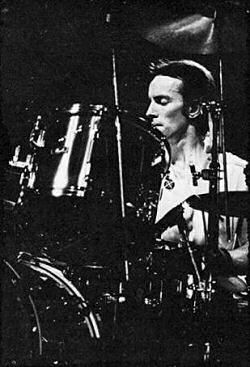 You were the only punk rocker to appear on the front cover of ‘International Musician’ which usually only featured fusion jazz players, it was quite a coup – how did that feel?
You were the only punk rocker to appear on the front cover of ‘International Musician’ which usually only featured fusion jazz players, it was quite a coup – how did that feel?
See, when I joined the band, everybody had their own individual roles, Joe was the spokesman, Mick was the sensitive songwriter and I became the ‘good drummer’. It sounds awfully big headed but I felt I was getting the praise I was due for being the musician in the band. And, to be honest with you, it wasn’t that bigger deal to me at the time – I just thought it was another interview.
You used a lot of percussion on much of The Clash’s material, which was not very punk. What inspired that?
It just happened. Some songs just called out for percussion. On the recordings I would often just hold the beat down and then do all the embellishments, and put all the colour on with percussion – and I was allowed to do that! The rest of the band thought it was great because it all added to it. I was free to add percussion and do what I wanted.
Where did the beat for Straight To Hell (Combat Rock) come from?
It’s a Latin American beat of some sort. It was just the first thing I did on the song – snare’s off, which wasn’t rock n roll, it was the first thing that came to me – and I overdubbed a hi hat part too.
What about the drum track on London Calling? (London Calling)
I didn’t want to just play straight all the way through so it had to grow. It was natural. I just made each section slightly different.
What about Rebel Waltz? (Sandinista)
I’ve never heard of a rock band being able to play a waltz before. I just thought, hold on, I’ll just anticipate the first beat. When Joe (Joe Strummer, singer and guitar player with The Clash) came in with a waltz I was like, great, (sighs) shall I get the brushes out? (Laughs) With what I’m doing with the beat you can really power through it.
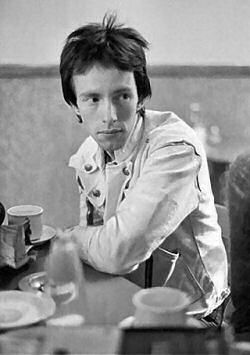 Where did your reggae feel come from?
Where did your reggae feel come from?
On the coach we always had loads of Reggae on and I presume Sly and Robbie were on a lot of it! Dillinger was a favourite too – Paul (Paul Simonon bass player and singer with The Clash) would put a reggae tape on of all sorts of stuff. We were always listening to reggae plus my jazz funk tapes and Joe would put on rock n roll or rockabilly stuff. Mick would play early hip-hop tapes and we all liked Taj Mahal as well.
What was it do you think that made The Clash so special.
It was like Joe said; it was the chemistry between the four of us. But, none of us really knew what made The Clash work. We didn’t know at the time that we had this amazing chemistry or that punk bands weren’t supposed to make triple albums (Sandinista) with Mose Allison songs and reggae songs. (Laughs)
I must say Paul was great for me. I’d really like to big him up here because he was so important to the bands sound. He really kept us happening on stage. If it wasn’t for Paul I couldn’t have done half the things I did on stage! He would play stuff exactly the same every night and that left room for me to do whatever I wanted. I could cross Paul and he’d stay rock steady, he’d take over the drum role and I could express myself – you know, just jam! I could hand over the keeping time stuff to Paul and I could just show off – and it worked. Paul was integral to The Clash – not just the sound but the art work and the look, with his low slung bass. Paul was vital to the band live; he stopped us becoming a jazz band! (laughs)
At the time The Clash were political, fighting the establishment, fighting the record company, triple albums for the price of one, “We aint doing Top Of The Pops”, you know? Brilliant! But as years have gone by, people who are into the band now, it’s the music that’s lived on, not the anti-Thatcher stuff or the miners and all that. It’s the music!
Some people take The Clash to absurd levels. Really, we were kids having fun. If you’d told me then that in 2009 we’d be selling just as many albums and people would want to interview me, I would never have believed them! I mean, we didn’t know! We were just enjoying being on the road. It was great fun and we loved each other and we’re still very fond of each other because we went through all that together. We were so naïve cos we wanted to be the biggest band in the world but we didn’t want to play the game.
I must admit though, when I first joined The Clash I thought a lot of the music left a lot to be desired! I loved Police And Thieves off the first album and there’s a lot of really good songs, 3 minute, fast, flash wonders but my influence on the band just – changed the band but it wasn’t a conscious thing. In those five years we did all that music, we made a colossal amount of music, we never stopped touring and people are still talking about us today. That’s a good feeling. It was strange in a way because The Clash somehow damaged everyone involved, including the crew. Some turned to drugs, others just became recluses, some just rejected the whole thing – but ultimately the bands legacy is in the music.
You wrote many songs for the band. How did you write and what instruments did you use?
Well, I can play the piano in D – but in D only, that’s why Rock The Casbah’s in D. I can play a great Mose Allison bass line and I used to play Stanley Clarke’s School Days on the bass too. It could be anything. I used to play all the instruments at sound checks and in rehearsals. I just picked it up.
 How did Rock The Casbah come about?
How did Rock The Casbah come about?
I was in the studio and they weren’t – that’s how Rock The Casbah happened. Mick and Joe weren’t really speaking by this point – we just weren’t gelling. The song was based around the piano – it was my song, my tune! Joe wrote the lyrics and then – Mick wants to put his wristwatch on there, “No! No way Mick!” He was upset because it was nothing to do with him really. I had this song where I’d done everything and it was me and Joe’s song – I laid down the drums, bass and piano when no one else was around.
The drum sound on London Calling was fantastic, however the sound on Combat Rock left a lot to be desired – why was that?
It was the production! We had to get Glyn Johns in, in the end cos we’d just made such a mess of it. Joe and Mick by now weren’t getting on at all. I was out to lunch all the time – we were kind of falling apart, none of us were enjoying it. It was about feel, we had to rescue that album. Mick tried mixing it but it didn’t work. I even had a go at mixing it. Mick’s tried, Joe’s tried, and Paul didn’t wanna do it so I did. Bless their hearts, love ‘em to death, there’s all three of them sitting behind me watching me trying to mix it. They’re all supporting me – “Come on Tops!” but every track ended up with all the faders up full.
What was the high point of the bands career for you?
Creatively it was London Calling. We were all really great mates at that time – we were really tight as friends. We loved each other’s company, we played lots of football and the music was taking off. That was when the band was at it’s happiest off stage as well as on – when the four of us were at our happiest together. I think that’s why the music comes across so well! London Calling was the last Clash album that was written, rehearsed and recorded! After that with Sandinista and Combat Rock well, we’d just go into a studio and bash it all down. London Calling was composed by Mick and Joe, and then we spent months rehearsing it and playing football together and then we went in and recorded it. I think it shows – we really worked hard on that record but had fun!
We had Guy Stevens who was a character, with all his madness, swinging ladders and fighting with Bill Price who was a brilliant engineer. I remember when we did Brand New Cadillac, one take that is. Guy said, “That’s it”, I said “Fuck off, it speeds up!” He said, “All great rock n roll speeds up!” I felt ashamed of speeding up; you shouldn’t do a track that speeds up should you? But at the same time I’d never done the bass drum fill through the gaps and I thought, “I love that bit, that’s working”.
What was the low point of the bands career?
It was the Combat Rock era. We just weren’t getting on! I remember we were mixing the record and my girlfriend said there was a drought on back in London, which meant there was no heroin. I said “OK; I’ve got some, I’ll bring some back from America” – that’s how much I’d lost the plot! So I say to the band, “I gotta pop back to London” and then – I got busted for trying to import heroin into the UK!
What are your personal favourite drum performances of yours from The Clash records?
Anything live! Complete Control and Armagideon Time, I loved my drumming on those from the live album From Here To Eternity. Look Here (Sandinista) I like that, with Mickey Gallagher on piano and me on drums and marimba. There’s a nice fill at the end where the drums and marimba play the same thing – I love that bit! Rebel Waltz, (Sandinista) I’m proud that I made a waltz a bit rock n roll. When it really comes down to it, I’m proud of it all – all of it!
 Did you ever use click tracks and if so how did you get on with them?
Did you ever use click tracks and if so how did you get on with them?
We never used clicks with The Clash. I don’t get click tracks, a click track is surely there if you can’t keep the tempo? I know film music needs a click for editing purposes – I played to a click track on my friend Steve’s album recently, I didn’t find it difficult but I didn’t enjoy it! But, a click track to me means you can’t hold the beat down. Sandy Pearlman, he referred to me as the human drum machine because I didn’t speed up and I didn’t slow down – and I didn’t make mistakes!
How did you feel when you finally parted from The Clash?
I got slung out of the band, not because of my drumming on stage or in the studio, I think if anything the drumming was getting better. I got slung out because of my behaviour – I was the one who messed myself up. There’s a lot of regret cos it was a great band, they were like my brothers and we were really, really close! I put them in a position where Joe and Bernie (Bernie Rhodes, Manager) wanted me out of the group because of my addictions – well that was in Joe’s case – Bernie had ulterior motives. They sacked me and I hadn’t seen it coming at all – I was crying and Mick was crying. I walked away . . . I was crying my eyes out and I went to go home and then I thought, hold on – I’ve got an idea! So I walked round the block and I went back and I said listen. “I’ll come on the American tour; I don’t want to get paid, you can take Terry Chimes (who played drums on the first album) as well, pay Terry my wages and if any of you even suspect that I’m doing drugs then you can send me straight home – and Terry’s there as a back-up!” Joe nearly broke, he said after that he nearly said “Yeah, good” but Bernie went “No! No!”
So, you’ve left the band, you’re heartbroken! How did the solo album come about?
My heroin addiction was in total control of me by now. I don’t think I could have played with anyone else by now cos I was known as a heroin addict. I mean I was slung out of The Clash for being a junkie – where do you go from there? The only thing musically I could do was write my own album. I mean in theory it would have been lovely to join another band but who’s gonna employ a junkie? I could get my own band together cos I had the clout of being Topper Headon from The Clash – and I could write all the songs. I could still very much call the shots even though I carried on using. With the album Waking Up it was all about giving up heroin but I hadn’t. When we were in Wessex recording, whenever they sent a journalist down to interview me I’d sit in front of a sun lamp. At the time I thought a suntan would cover anything!
Why didn’t you make any more solo records?
Because I went to jail! I came down to Dover and gave a bloke some heroin – he overdosed and died. I went to prison for fifteen months. I mean it was about five quid’s worth but they made an example of me. Horrible times!
I didn’t even listen to music anymore. I totally lost interest in music by that point. I got out of prison and started mini cabbing. I didn’t have anything to do with music. I just stopped listening. Heroin took away all my spirit. Heroin killed me inside; it killed all my feelings, all my creativity. It’s just a horrible, horrible drug!
That’s very sad. When did you really turn things around?
Five years ago – I’ve been clean for five years and I feel great.
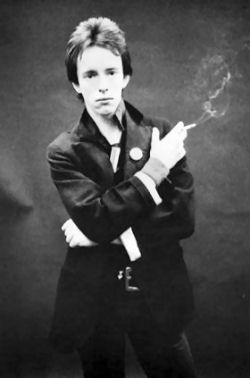 What was your reaction to Joe’s untimely death?
What was your reaction to Joe’s untimely death?
Devastated! Of all the people in The Clash to go you would never have thought it would be Joe first. I suppose it should have been me first and then . . . Mick. You know, Joe ran marathons, he was a vegetarian . . . it was a real shock! (long pause)
Being in The Clash really bonded us, it was such an amazing experience but only the four of us experienced it. So many people around the band ended up with severe drug problems but Joe wasn’t one of them . . . I just miss him really. Not that I saw him every day because he lived in Somerset but I knew he was there. I’m still in touch with his wife Lucinda, I recently donated my Mini Cooper to the Strummeville charity, Joe’s charity.
Who are your favourite drummers now and what music do you listen to these days?
I like Taylor Hawkins (Foo Fighters), I love the way he whips that snare drum but I reckon he’s gonna have problems with his wrists later on. I love Chad Smith, I think he’s a shit hot drummer but too tall to be a drummer (laughs). I don’t really listen to a lot of the modern players – I mean they’re phenomenally fast, you know with their feet but they don’t seem to have much feel – I haven’t gone down that road. I listen to N.E.R.D. I‘ve got the new Grace Jones album and I listen to a load of old stuff as well.
Your drug addiction is well documented but you have been clean for 5 years. How is everything going and what are you doing now – do you still play regularly?
Well, I still play for fun but because I didn’t play for so long, because of my addiction – I didn’t listen to music and I didn’t play- the music died in me, the whole spirit went. Then I got clean and gradually I started listening to music again and thought, yeah this is good but I’ve lost the stamina. I lost the technique a little bit and I’ve lost the power too. In my case I drummed and I was good at it but then I messed up and I didn’t listen to music and I didn’t play. Now I do it just for fun.
I look at myself as a heavyweight boxer; I finished at the top. Even though it was years ago – when you listen to Topper Headon it’s all spot on. It’s much better to retire at the top! I wouldn’t choose to make a comeback. Financially I don’t have to play, I’d rather write a book and do my charity stuff – the Hepatitis C stuff. I sit in every now and then with people. I’m looking forward to writing the book; I think it’s worth doing and if Mick asked me to sit in on a number for Carbon Silicone, I’d love to do that. I got arthritis in my right thumb and that holds me back too. I’m happy to just play for fun now. I’m glad The Clash finished when it did, I’m glad we didn’t limp on.
Love every minute of it. Enjoy every minute. Appreciate it and try not to get carried away because it can be a short career
 What would your advice about the business and fame be to aspiring young drummers?
What would your advice about the business and fame be to aspiring young drummers?
Love every minute of it. Enjoy every minute. Appreciate it and try not to get carried away because it can be a short career – and be careful! Adrenalin is a very powerful drug – adrenalin and fame together can be a pretty heady cocktail! When you’re in your early 20’s and you’ve got the world at your feet and you’ve got money plus adrenalin and fame – it can be very toxic! At the time when I was successful I just didn’t appreciate that I was in fact, living the dream. I took no photographs or anything – I took it all for granted in a way.
When I was at school we all wanted to be rock stars but I was the only one who stuck to it and gave it my all. I left school with no qualifications and went down to London, I was lucky really but my friends played it safe . . . I would say you have to take chances and give it everything . . . everything!
Should young guys get themselves a drum tutor?
It’s only my experience but I don’t see the need for a teacher unless you want to read music. I can’t read music but I think by watching and listening you can learn everything! How do kids learn to play football? They . . . watch. And they . . . learn! With music you watch and you listen, that’s how I learnt! I just listened and watched. Copy people (laughs) and make a hybrid of all the styles. Watch as many different styles as you can and just take the best bits from each and turn them into one style!
Is there anything you would like to say to close?
Well, it’s a miracle I’m still alive. I didn’t really live when I was addicted to heroin it was just a sad, horrible existence and now I’ve come through the other end – I just want to enjoy life!
Interview by Steve Grantley


